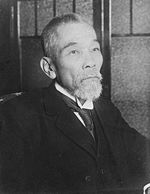
Rikken Kokuminto
Encyclopedia

Political party
A political party is a political organization that typically seeks to influence government policy, usually by nominating their own candidates and trying to seat them in political office. Parties participate in electoral campaigns, educational outreach or protest actions...
in the Empire of Japan
Empire of Japan
The Empire of Japan is the name of the state of Japan that existed from the Meiji Restoration on 3 January 1868 to the enactment of the post-World War II Constitution of...
. It was also known as simply the 'Kokumintō’.
The Kokumintō was founded in March 1910, by a merger of the Kensei Hontō with a number of minor political parties and groups within the Lower House
House of Representatives of Japan
The is the lower house of the Diet of Japan. The House of Councillors of Japan is the upper house.The House of Representatives has 480 members, elected for a four-year term. Of these, 180 members are elected from 11 multi-member constituencies by a party-list system of proportional representation,...
of the Japanese Diet, and was dominated by Inukai Tsuyoshi
Inukai Tsuyoshi
was a Japanese politician and the 29th Prime Minister of Japan from 13 December 1931 to 15 May 1932.-Early life:Inukai was born to a former samurai family of the Niwase Domain, in Niwase village, Bizen Province , and was a graduate of Keio Gijuku in Tokyo. In his early career, he worked as a...
. It advocated a constitution
Constitution
A constitution is a set of fundamental principles or established precedents according to which a state or other organization is governed. These rules together make up, i.e. constitute, what the entity is...
, an electoral franchise based on universal adult male suffrage
Suffrage
Suffrage, political franchise, or simply the franchise, distinct from mere voting rights, is the civil right to vote gained through the democratic process...
and increased spending for the Imperial Japanese Navy
Imperial Japanese Navy
The Imperial Japanese Navy was the navy of the Empire of Japan from 1869 until 1947, when it was dissolved following Japan's constitutional renunciation of the use of force as a means of settling international disputes...
. It took a strong stand against the power and influence of the genrō
Genro
was an unofficial designation given to certain retired elder Japanese statesmen, considered the "founding fathers" of modern Japan, who served as informal extraconstitutional advisors to the emperor, during the Meiji, Taishō and early Shōwa periods in Japanese history.The institution of genrō...
and Meiji oligarchy
Meiji oligarchy
The Meiji oligarchy was the name used to describe the new ruling class of Meiji period Japan. In Japanese, the Meiji oligarchy is called the ....
. In the 1912 General Election, the new party secured 95 seats, making it the single largest opposition party (to the Rikken Seiyukai
Rikken Seiyukai
The was one of the main political parties in the pre-war Empire of Japan. It was also known simply as the ‘Seiyūkai'Founded on September 15, 1900 by Itō Hirobumi , the Seiyūkai was a pro-government alliance of bureaucrats and former members of the Kenseitō. The Seiyūkai was the most powerful...
) in the Lower House.
In January 1913, about half of the party defected to join the Rikken Dōshikai
Rikken Doshikai
The was a political party active in the Empire of Japan in the early years of the 20th century. It was also known as simply the Dōshikai.Founded by Prime Minister Katsura Tarō on February 7, 1913, the Rikken Dōshikai largely served to support his cabinet against criticism by the Rikken Seiyūkai...
founded by Katsura Tarō
Katsura Taro
Prince , was a general in the Imperial Japanese Army, politician and three-time Prime Minister of Japan.-Early life:Katsura was born into a samurai family from Hagi, Chōshū Domain...
. In the 1915 General Election, the Kokumintō managed to retain only 27 seats. It was able to recover to 35 seats in the 1917 General Election, but in the 1920 General Election
Japanese general election, 1920
The was the Empire of Japan’s fourteenth general election for members of the House of Representatives of the Diet of Japan, held on May 10, 1920. The Rikken Seiyūkai, led by Prime Minister Hara Takashi expanded on its majority of seats in the Diet.-Results:...
, dropped back to only 29 seats.
In September 1922, the Kokumintō disbanded, and many of its former members formed the core of the new Kakushin Kurabu, also led by Inukai Tsuyoshi.

